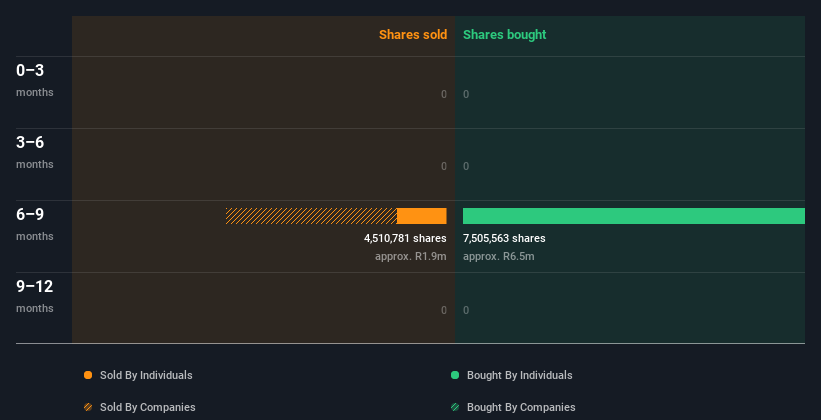
Insiders who acquired R6.08m worth of Purple Group Limited's (JSE:PPE) stock at an average price of R0.81 in the past 12 months may be dismayed by the recent 13% price decline. Insiders buy with the expectation to see their investments rise in value over a period of time. However, recent losses have rendered their above investment worth R4.13m which is not ideal.
While we would never suggest that investors should base their decisions solely on what the directors of a company have been doing, logic dictates you should pay some attention to whether insiders are buying or selling shares.
View our latest analysis for Purple Group
The Last 12 Months Of Insider Transactions At Purple Group
The Non-Executive Director Mark Barnes made the biggest insider purchase in the last 12 months. That single transaction was for R6.1m worth of shares at a price of R0.81 each. So it's clear an insider wanted to buy, even at a higher price than the current share price (being R0.55). While their view may have changed since the purchase was made, this does at least suggest they have had confidence in the company's future. In our view, the price an insider pays for shares is very important. As a general rule, we feel more positive about a stock if insiders have bought shares at above current prices, because that suggests they viewed the stock as good value, even at a higher price.
Happily, we note that in the last year insiders paid R6.1m for 7.51m shares. On the other hand they divested 1.02m shares, for R213k. In the last twelve months there was more buying than selling by Purple Group insiders. You can see the insider transactions (by companies and individuals) over the last year depicted in the chart below. If you want to know exactly who sold, for how much, and when, simply click on the graph below!

Purple Group is not the only stock insiders are buying. So take a peek at this free list of growing companies with insider buying.
Insider Ownership Of Purple Group
I like to look at how many shares insiders own in a company, to help inform my view of how aligned they are with insiders. We usually like to see fairly high levels of insider ownership. From our data, it seems that Purple Group insiders own 13% of the company, worth about R102m. However, it's possible that insiders might have an indirect interest through a more complex structure. Overall, this level of ownership isn't that impressive, but it's certainly better than nothing!
So What Do The Purple Group Insider Transactions Indicate?
It doesn't really mean much that no insider has traded Purple Group shares in the last quarter. However, our analysis of transactions over the last year is heartening. Judging from their transactions, and high insider ownership, Purple Group insiders feel good about the company's future. In addition to knowing about insider transactions going on, it's beneficial to identify the risks facing Purple Group. Every company has risks, and we've spotted 3 warning signs for Purple Group you should know about.
Of course Purple Group may not be the best stock to buy. So you may wish to see this free collection of high quality companies.
For the purposes of this article, insiders are those individuals who report their transactions to the relevant regulatory body. We currently account for open market transactions and private dispositions of direct interests only, but not derivative transactions or indirect interests.
New: Manage All Your Stock Portfolios in One Place
We've created the ultimate portfolio companion for stock investors, and it's free.
• Connect an unlimited number of Portfolios and see your total in one currency
• Be alerted to new Warning Signs or Risks via email or mobile
• Track the Fair Value of your stocks
Have feedback on this article? Concerned about the content? Get in touch with us directly. Alternatively, email editorial-team (at) simplywallst.com.
This article by Simply Wall St is general in nature. We provide commentary based on historical data and analyst forecasts only using an unbiased methodology and our articles are not intended to be financial advice. It does not constitute a recommendation to buy or sell any stock, and does not take account of your objectives, or your financial situation. We aim to bring you long-term focused analysis driven by fundamental data. Note that our analysis may not factor in the latest price-sensitive company announcements or qualitative material. Simply Wall St has no position in any stocks mentioned.
About JSE:PPE
Purple Group
A financial services and technology company, engages in trading platforms, fractional property and crypto asset investing, retirement fund administration, and asset management businesses in South Africa.
Excellent balance sheet with acceptable track record.
Market Insights
Community Narratives




